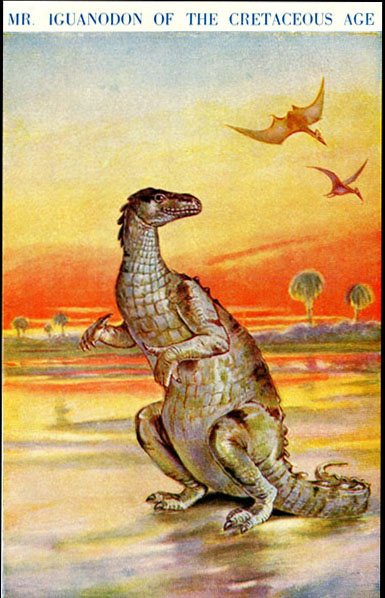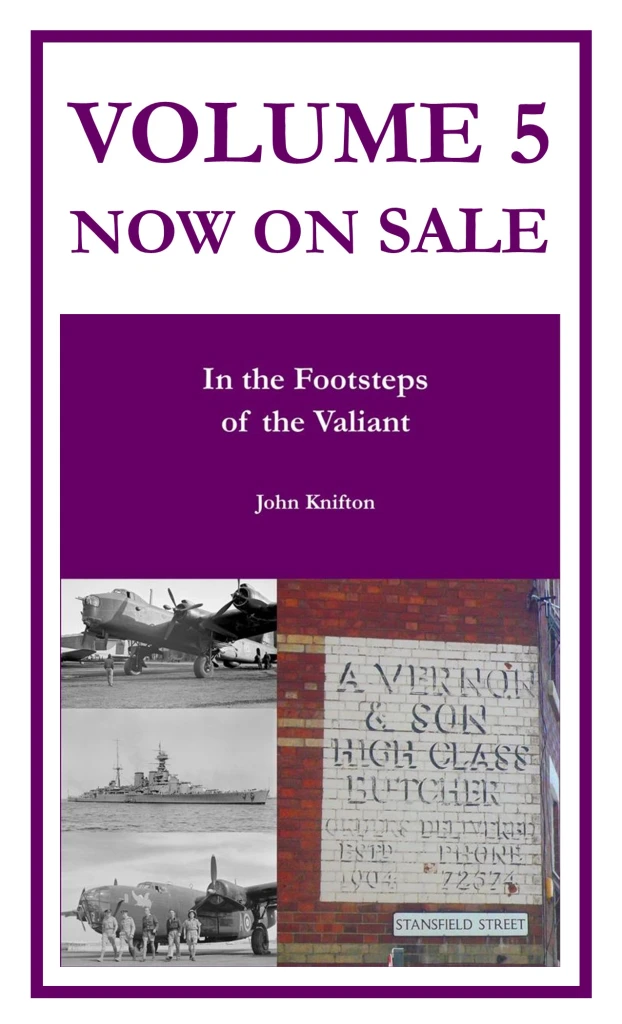My Grandfather, Will, had apparently always loved poetry, and in this respect, his son, and my Dad, Fred, was to follow willingly in his father’s footsteps. This burgeoning love of rhyme was nurtured and encouraged by the fact that, like many children in the British Empire, Fred possessed a set of “The Children’s Encyclopedia” by Arthur Mee, a famous, familiar and popular book of the 1930s:
Arthur Mee believed that the English, and in particular the English boy, were the “peak of creation”, although my mother, well familiar both with me and her husband, thought he was a madman. Each volume of Mee’s ten volume set of encyclopedias contained sixteen different themes or subjects and great prominence was always given to the Poetry sections, which were selected by Sir John Hammerton, a famous contemporary historian. Fred also liked the dinosaur pictures too:

Fred would often quote poetry, and his three favourite lines were……
“Season of mists and mellow fruitfulness ”
This is a line of Keats which was automatically triggered by any mention whatsoever of autumn. Or by a walk into a wood in autumn. Or a TV programme about autumn.
Keats’ best pal, Shelley, wrote the lines which are in second place:
“Hail to thee, blithe Spirit!
Bird thou never wert,”
These words would invariably emerge should any sighting of a skylark occur, perhaps during a walk alongside a field of corn. Quite often, it would be just any bird seen to be doing skylarky type things:

In third place came the rather wise, and arguably, slightly incorrect ……
“What is this life if so full of care,
We have no time to stand and stare ? ”
The correct version has no “so” and, surprisingly, no question mark:
“What is this life if, full of care,
We have no time to stand and stare. ”
The poem was written by William H Davies, a Welsh poet, who spent many years as a tramp or hobo, in the United Kingdom and the United States. Presumably my Dad did not know that he was Welsh. Being Welsh was never a plus point with my Dad.
Fred always professed that his favourite poet was John Clare. You can read about him in one of my early and probably over long posts, here.
And this is John Clare, perhaps “before” and “after” the boiled egg hairstyle became popular:
In retrospect, I have always felt that Fred saw Clare as the simple, agricultural working class man, held firmly in his place in a world dominated by the upper classes, who were, for the most part as poets, fairly worthless and useless aesthetes, lacking Clare’s poetic talents, his intelligence and his capacity for accurate observation of the world around him. Perhaps too, as a native of the simple country village of Woodville, Fred could recognise the truth of the statement by Ronald Blythe, the President of the Clare Society, that the impoverished poet was “England’s most articulate village voice”.
It is not a giant leap, of course, to say that Fred probably saw his own life as directly paralleling that of Clare, denied as he was for purely financial reasons, the chance to go to a grammar school, and to have the same education as the more successful, and much less talented, upper class people that he would meet during the rest of his life, particularly in the RAF.
Given this love of John Clare, therefore, every time that he physically saw one running about, perhaps in a school playground when he was on yard duty, Fred would always identify this black and white bird as the “little trotty wagtail”, a phrase taken from one of Clare’s most frequently quoted poems:








Fond memories and a fine assessment of John Clare
As a bird watcher, what struck me most about Clare was how he had clearly watched the birds he wrote about closely and for extended periods. He had great knowledge of the habits of the nightingale, for example. In contrast, I have seen articles by birdwatchers, arguing that in “Ode to a Nightingale” by Keats, the bird in question was not a nightingale burt something else.
Fond memories of your Dad and the poets. My favorite lines (and the apply to today as well)…
“What is this life if, full of care,
We have no time to stand and stare. ”
I would certainly agree with you there. I’ve spent many a five minutes on holiday in Cornwall, leaning over a five-bar gate, staring at the fields, watching the cows, and waiting for nothing to happen.
Perhaps we’d all be happier if we did that at least once a day. And it doesn’t have to be in Cornwall !
Exactly!!
Arthur Mee also had a series of books on English Counties. My Dad had several but I have no idea what became of them.
Yes, my Dad also had a few, He seemed to have bought Derbyshire because he lived there and Worcestershire because he did his teacher training there, in a place called Shenstone. We bought Cornwall ourselves but to be honest I was never impressed by them. Not enough pictures of dinosaurs!
I am still on the look out for Leicestershire.
I searched for it at:
https://www.abebooks.co.uk/servlet/SearchResults?sts=t&cm_sp=SearchF-_-home-_-Results&tn=leicestershire&an=mee
and this is a nice copy at a decent price. If you do buy any, be careful over which edition it is:
https://www.abebooks.co.uk/servlet/BookDetailsPL?bi=30309264735&searchurl=an%3Dmee%26sortby%3D17%26tn%3Dleicestershire&cm_sp=snippet-_-srp1-_-title20
Thank you John.
I have friends who live in Oakham who would be horrified by the book title ‘Leicestershire and Rutland’ They would prefer to have a book dedicated to Rutland and if not would like it to be ‘ Rutland and Leicestershire’.
Lovely memories John. Your dad was obviously influenced by poetry and rightly so.
He certainly was! He did use poetry a lot with his classes which were mostly Year 4 when he worked in a junior school. One particular poem was a ghostly story and it scared the crêpe out of us. I’m going to do a blog post about it in the future, when I can pluck up courage!
Thankyou for sharing your memories. Aravind likes poetry of all types. I don’t like the complicated ones which are difficult to understand and als0 the very depressing ones 🙂
These lines are so beautiful-
“What is this life if, full of care,
We have no time to stand and stare. ”
There are a lot of poets in English and they don’t seem to think that they have composed a good poem unless it is in a special language that they have invented. The internet gives you a wonderful chance to sample the poems of any poet you wish to. I haven’t used this site, but it seems worth a look:
https://archive.org/about/
I remember The Children’s Encyclopedia’. There was one in my dad’s bookcase – just the one volume. It fascinated me. Sadly, when my parents moved house it went to a charity shop. I have to confess that poetry was never part of my childhood. My dad was more inclined to quote verses from the Bible. Poetry did not really impinge on my consciousness until I was in my early thirties when I encountered Dylan Thomas’s ‘Do Not Go Gentle Into That Good Night’. It was at that moment I came to understand the power of poetry. It remains one of the three poems I have memorised, the other two being Larkin’s ‘This Be The Verse’ and Housman’s ‘Into My Heart An Air That Kills’.
Having had my mother dispose of a lot of my things when I moved to Nottingham, I was very careful to make sure that nothing went out of the house without my knowledge.The best find was a long forgotten WW2 German helmet I had bought in a French market from a chap who had dug it up with his plough.
I am impressed that you have learnt those poems off by heart. All I can offer is a few from school which we did for homework. “Once more until the breach”, something by Louis MacNiece and a translation from Yevtushenko. And with those, it’s only the odd phrase.
The best way to get a copy of the encyclopedia might be to look through abebooks. Here’s the link:
https://www.abebooks.co.uk/servlet/SearchResults?sts=t&cm_sp=SearchF-_-home-_-Results&tn=the%20childrens%20encyclopedia